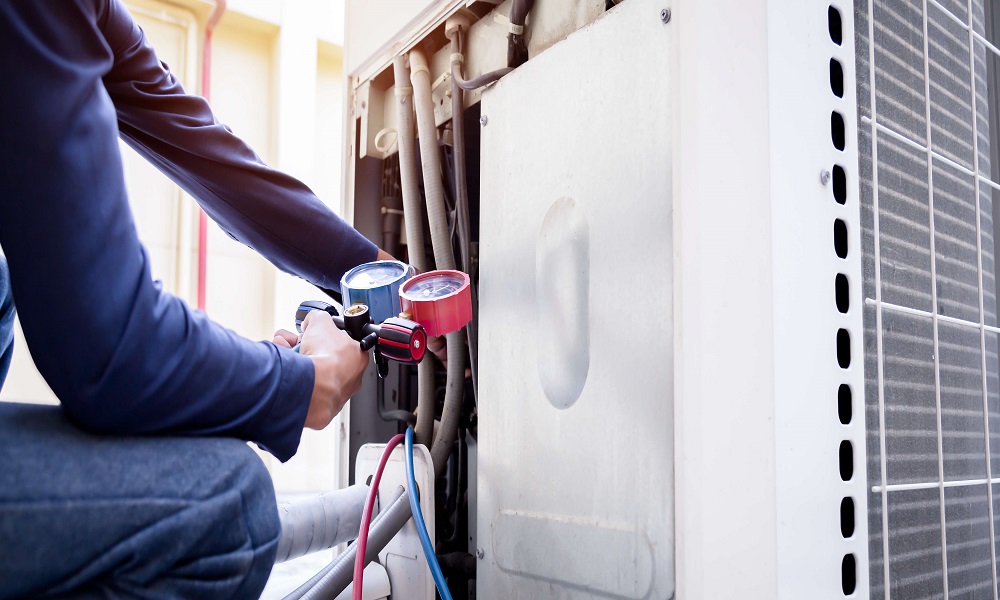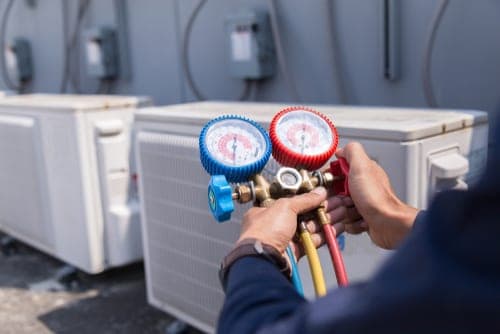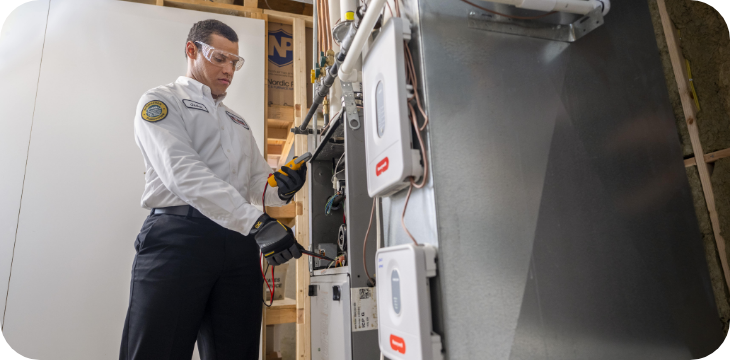Upgrade Your System Today with DMAKS HVAC Expert Solutions.
Upgrade Your System Today with DMAKS HVAC Expert Solutions.
Blog Article
How to Choose the Right HVAC System for Your Needs
Picking the appropriate HVAC system is a crucial decision that requires mindful consideration of numerous factors. Begin by assessing your home's dimension, design, and unique requirements, as these aspects determine the required ability and setup of the system. Furthermore, establishing a budget plan that incorporates setup and lasting operational prices is vital. As you evaluate your alternatives, comprehending power performance ratings and the implications of your regional climate will certainly play a significant role in your selection. The myriad of system types available can complicate this procedure, leading one to question which course inevitably leads to optimal convenience and effectiveness.
Analyze Your Home Size
Examining your home dimension is a critical initial step in choosing the appropriate heating and cooling system. The dimension of your home directly affects the cooling and heating capacity required for reliable environment control. A heating and cooling system that is as well little will certainly struggle to maintain comfortable temperatures, causing raised power intake and endure the system. Conversely, an oversized system can cause short cycling, insufficient humidity control, and inefficient procedure.
To precisely evaluate your home dimension, measure the square video of each area, taking into consideration aspects such as ceiling height and the format. Additionally, take into consideration the insulation top quality and the number of home windows, as these elements affect thermal performance. Homes with open layout might need different system setups compared to those with lots of separated spaces.
Using the Handbook J lots computation method can give a more accurate quote of your cooling and heating needs. This approach accounts for various aspects, consisting of regional climate, solar gain, and tenancy patterns. By meticulously assessing these facets, you can make certain that your picked HVAC system is suitably sized, causing boosted comfort, power effectiveness, and long life of the equipment.
Determine Your Budget
Identifying your budget plan is a pivotal action in the HVAC system choice procedure, as it sets the criteria for your alternatives - DMAKS HVAC. A HVAC system is a substantial financial investment, and recognizing your monetary limits will certainly help limit selections that fit within your ways
Begin by evaluating not just the first purchase cost yet additionally setup prices, which can differ considerably depending upon the intricacy of the project. Additionally, think about ongoing expenditures such as upkeep, repair work, and energy usage. A system might show up affordable originally but can cause greater prices over time if it is less effective.
It is recommended to allot a contingency fund for unexpected expenditures that might arise during installation or initial system modifications (DMAKS HVAC). Furthermore, check out funding choices or refunds that may be offered, as these can alleviate the problem of in advance prices
Eventually, having a clear budget plan permits you to involve with heating and cooling professionals extra successfully, ensuring you obtain tailored suggestions that lines up with your financial objectives and home needs. By being attentive regarding your spending plan, you can make educated choices that improve convenience without jeopardizing economic stability.
Evaluate Power Effectiveness
Power effectiveness plays an essential function in the total performance and cost-effectiveness of your cooling and heating system. When choosing a system, it is necessary to consider its energy performance ratings, as these numbers straight affect your energy bills and environmental impact. Search for systems with Continue a high Seasonal Power Efficiency Ratio (SEER) for cooling down and a high Annual Gas Utilization Effectiveness (AFUE) ranking for home heating. Higher scores show greater effectiveness, meaning even more convenience for much less energy usage.
Additionally, think about the Energy Celebrity qualification, which indicates that the system meets strict effectiveness standards established by the Epa. Investing in an Energy Star-rated a/c system can cause substantial financial savings with time, specifically in locations with severe temperature level variations.
An additional variable to review is the system's dimension and ability. An extra-large or small system can cause ineffectiveness and boosted energy expenses. DMAKS HVAC. Proper sizing, frequently identified with a Hands-on J lots computation, makes sure that the system operates at optimal efficiency


Think About Environment and Setting
When picking a HVAC system, it is important to think about the regional environment and ecological conditions, as these variables significantly influence the system's performance and efficiency. Different areas experience differing temperature level extremes, moisture degrees, and seasonal adjustments, every one of which influence home heating and cooling down demands.

Additionally, neighborhood environmental variables, such as air quality and possible allergens, ought to educate your choice. Solutions equipped with sophisticated purification technologies can assist mitigate contaminants and supply cleaner air. Additionally, think about the power wikipedia reference resources available in your area-- some a/c systems are more effective when powered by gas or renewable resource sources.
Eventually, straightening your HVAC system selection with your regional environment and ecological considerations will result in improved convenience, boosted performance, and lower energy costs.
Explore System Types and Functions
As house owners look for to maximize convenience and performance, discovering the various kinds of heating and cooling systems and their distinct functions ends up being necessary. The key kinds of cooling and heating systems include air conditioning, heatpump, ductless mini-split systems, and heaters. Each system provides i was reading this distinctive advantages tailored to various requirements and choices.
Central air conditioning systems offer uniform cooling throughout a home, making them perfect for larger spaces. Heat pumps act as both home heating and cooling down options, using electrical energy to transfer heat, which can result in reduced power expenses. Ductless mini-split systems are becoming significantly prominent because of their flexibility and convenience of installment, enabling property owners to control the temperature level in specific areas without considerable ductwork.

Conclusion
To conclude, picking the suitable cooling and heating system demands careful consideration of various elements, including home dimension, budget plan restraints, power performance, neighborhood environment, and available system types. An extensive evaluation of these aspects makes certain optimum convenience and cost-effectiveness. By adhering to an organized technique, home owners can make enlightened choices that line up with their certain requirements and preferences, eventually resulting in enhanced indoor air quality and power financial savings.
Report this page